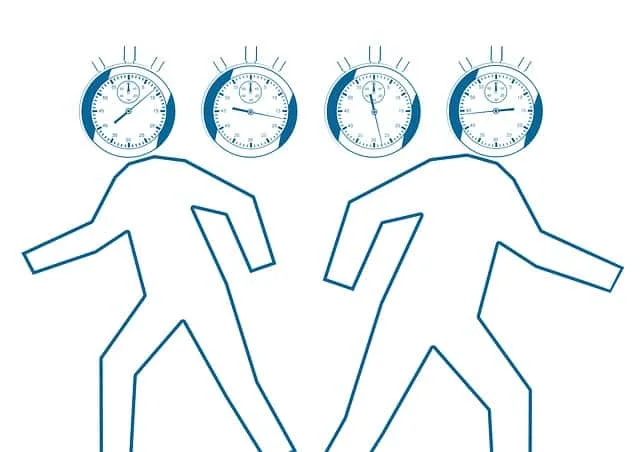
Anxiety is much more than a mental disorder. It can impact every aspect of your overall health. Here’s how anxiety affects our bodies and how to manage it.
1. It Makes You Restless
Remember the night before Christmas when you were a kid? You probably couldn’t sleep because you were so anxious to see what Santa left under the tree. That restless feeling resulted from the stress hormones adrenaline and cortisol at work.
Psychologists differentiate between good and bad stress. A little bit of pressure is motivating — it’s what inspires you to get off the couch and go to work each day. Too much, however, turns toxic, making it challenging to get anything accomplished. You end up feeling crushed under the weight of excessive demands, unable to do anything.
The best way to react if you notice stress causing overwhelming restless feelings is to address the situation. For example, if you’re constantly panicking about not making enough to pay your bills, could you transform 15 minutes of worry time into a job search or upgrading your resume?
2. It Can Break Your Teeth
Excess stress can lead to bruxism, or tooth-grinding, which can result in a costly dental visit. Unfortunately, a trip to the tooth doctor can also create anxiety. Fortunately, many of today’s practitioners recognize the effect of patient stress on appointment compliance and offer multiple sedation options to make your visit more comfortable.
Your doctor can fit you with a custom mouthguard. You may need to wear this device when you sleep to protect your pearlies.
3. It Makes You Irritable
Who among us hasn’t snapped at our loved ones when we feel stressed? While such behavior is understandable, it doesn’t make it okay.
People are social creatures who need solid relationships for both physical and emotional health. Loneliness increases mortality from all causes, and you don’t want to drive your support system away when you’re stressed. When you notice yourself getting testy, it’s time to participate in healthy relaxation techniques like yoga, meditation, or even a relaxing walk in nature.
4. It Makes It Hard to Get Your Zzzs
Anxiety can keep you tossing and turning at night. Insomnia can lead to a lack of concentration and focus, resulting in careless mistakes that invite more stress into your life.
If you notice that you can’t fall under, examine your bedroom environment. If the tricks you use to improve your sleep hygiene don’t help, it’s time to talk with your doctor. They may prescribe a short-term dose of medication to help you get the rest you need to regain a healthier perspective.
5. It Can Give You Headaches
Tension headaches can be painful. If you feel pressure on your temples by mid-afternoon, pay attention to your anxiety levels.
Anxiety causes your muscles to contract. When this occurs in the tiny ones around your eyes, it can cause severe headaches. Try breathing relaxation into these areas, closing your peepers to protect them from the screen, and focusing on relaxing your jaw and forehead.
6. It Could Pack on Unwanted Pounds
Anxiety causes an increase in cortisol production. This stress hormone tells your body to prepare for a continued onslaught. Only, it doesn’t recognize that modern threats don’t require as many calories to fight as it once took to flee hungry lions.
Therefore, you start craving foods high in sugar and fat. While this mechanism once gave you the requisite energy to survive physical threats, it now results in unwanted love handles and excess pressure on your internal organs.
7. It Increases Chronic Pain
The same mechanism that causes headaches can increase chronic pain. Anxiety can cause muscles anywhere in your body to tense and spasm.
Pay attention to your flares if you have a condition like rheumatoid arthritis or Crohn’s disease. They could indicate that you have too much stress in your life, and it’s time to ask for help.
8. It Makes You More Susceptible to Addiction
Addiction is a complicated disease. While anxiety alone won’t cause you to get hooked, it can make you reach for the bottle to ease your nerves.
The problem results when you start needing more and more of the same substance to get the desired effects. Your body begins forming a chemical dependency on your drug of choice. Please try to avoid turning to drugs or alcohol to deal with stress, as you could find yourself battling the disease of addiction, too.
9. It Can Affect Your Heart
If you have a family history of heart disease, you should pay particular attention to easing your anxiety. Recent research out of Australia suggests that ongoing stress causes changes in the brain, rewiring it to keep your blood pressure elevated.
Heart disease remains the number one killer of men and women worldwide. Please lower your risk by managing your anxiety through stress-reduction techniques like yoga and seeking therapy when necessary.
Learn How Anxiety Affects Our Bodies and How to Manage It
Anxiety can harm your body in various ways. Please use stress-reduction techniques to get a handle on your emotions and reach out for help if you feel overwhelmed.
- Sagittarius Man & Gemini Woman Love and Sex Compatibility - January 31, 2024
- Taurus Ascendant Rising Personality Traits in Men (Guide) - January 31, 2024
- How to Seduce and Attract a Sagittarius Man (Seduction Tips) - January 31, 2024
